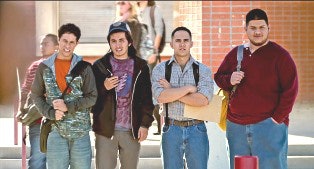 A still from Spare Parts features the robotics teammates (from left to right): David Del Rio as Cristian Arcega, José Julián as Lorenzo Santillan, Carlos PenaVega as Oscar Vazquez, and Oscar Gutierrez as Luis Aranda.
A still from Spare Parts features the robotics teammates (from left to right): David Del Rio as Cristian Arcega, José Julián as Lorenzo Santillan, Carlos PenaVega as Oscar Vazquez, and Oscar Gutierrez as Luis Aranda.College should be the default expectation for students from early on, and Congress should give the children of undocumented immigrants permanence so that they can realize their college dreams here in the United States.
That’s the two-fold message that Oscar Vazquez hopes people get from “Spare Parts”—a new movie that recounts how he and a team of mostly undocumented Mexican immigrants at an Arizona high school built a ragtag robot that enabled them to defeat MIT in an underwater robotics competition in 2004.
Vazquez said the movie , which debuts Friday and stars comedian George Lopez, did a “good job” of portraying the unlikely story of how Vasquez and his comrades at Carl Hayden Community High School in Phoenix had bested students from an elite college in the robotics competition.
It’s the reality surrounding the story—low expectations for students in struggling schools and the constant threat of deportation for undocumented students—that he would like to see changed.
“All I was prepared to do was graduate high school,” Vazquez said during a panel discussion that followed a private screening of the movie in Washington, D.C.
“Now, they’re doing a pretty good program where they try to get kids interested in college from the get-go, changing the mindset,” Vazquez said of the robotics program at his high school alma mater.
“I wish that happened when I was there,” Vazquez said. “When I was there, the mindset was: ‘Graduate from high school and you’re good.’”
Vazquez said the lack of emphasis on college during his high school years impacted his post-secondary career.
“It was an uphill battle. I wasn’t prepared,” Vazquez said of college. “I had to go to community college. Then that was going to be it.”
After a magazine article told the story of Vazquez and his teammates, readers began to contribute money to help them go to college.
Vazquez ultimately graduated from Arizona State University in 2009 with a degree in engineering. But even with a degree in mechanical engineering from ASU, Vazquez’s immigration status was unresolved.
So he took a gamble and voluntarily deported himself to Mexico, leaving behind his wife and their young daughter. Fortunately, the Obama administration granted him a waiver to reenter the United States—something the law would have otherwise required him to wait 10 years to do.
When Vazquez returned to the U.S., he joined the Army and served in Afghanistan. Today he’s a mechanical foreman for BNSF railroad in Montana.
“I still get to use some of my engineering background,” Vazquez said of his job. “Not much, but still, it’s a technical related field.”
Despite their win over MIT, Vasquez’s fellow teammates went into non-technical fields. Two run a catering business and hold down other jobs—one as a janitorial supervisor at a courthouse and one as a mechanic and cook. Another reportedly left ASU after losing a scholarship when voters passed a measure that barred state assistance to people in the country illegally, according to news reports.
Vazquez said he hopes the movie “Spare Parts” does more to inspire educators to get students to focus on going to college at a young age.
“Change the mindset would be the first goal in getting even young students to go to higher education,” Vazquez said. “If the mindset’s not changed, there’s no kid to take advantage of it,” he said of higher education.
The second goal, Vazquez said, is to change immigration law so that undocumented students can plan for college.
“They don’t see college in their future,” Vazquez said of undocumented students who face constant uncertainty about whether and how long they will be able to remain in the United States.
George Lopez—who portrays the teacher who helped guide the team toward their robotics competition win—said he hopes the movie gets people to see the value of diversity in making the United States a stronger nation.
“Not accepting diversity hurts both sides,” Lopez said during the panel discussion. “Diversity is the future not only through Latinos but through all nationalities.”
Marshall Fitz, Vice President for Immigration Policy at the Center for American Progress, a liberal think tank that hosted the screening, said it will take more movies like “Spare Parts” to change the cultural norms in this country “so that people understand our broken immigration system is crushing dreams. It’s not facilitating dreams.”
U.S. Sen. Dick Durbin (D-Illinois), who has mounted a longstanding effort to pass the DREAM Act, which would create a pathway to citizenship for certain undocumented students if they go to college or serve in the military, called “Spare Parts” an “amazing inspiring story.”
“But there are thousands just like it,” Durbin said of undocumented students. “There’s about over two million lives in America that will be changed for the better and a country that will become better when the DREAM Act becomes the law of the land.”















